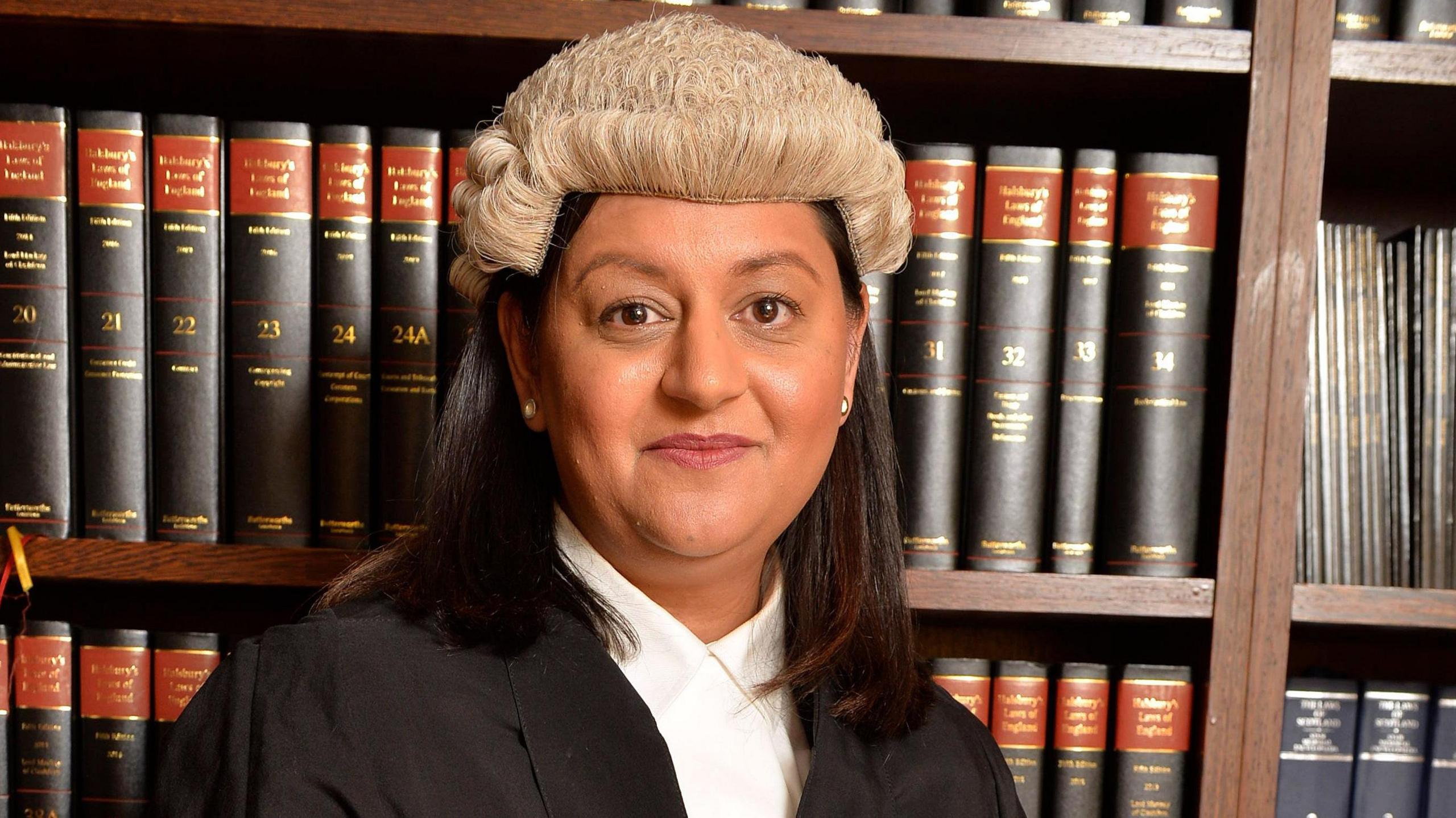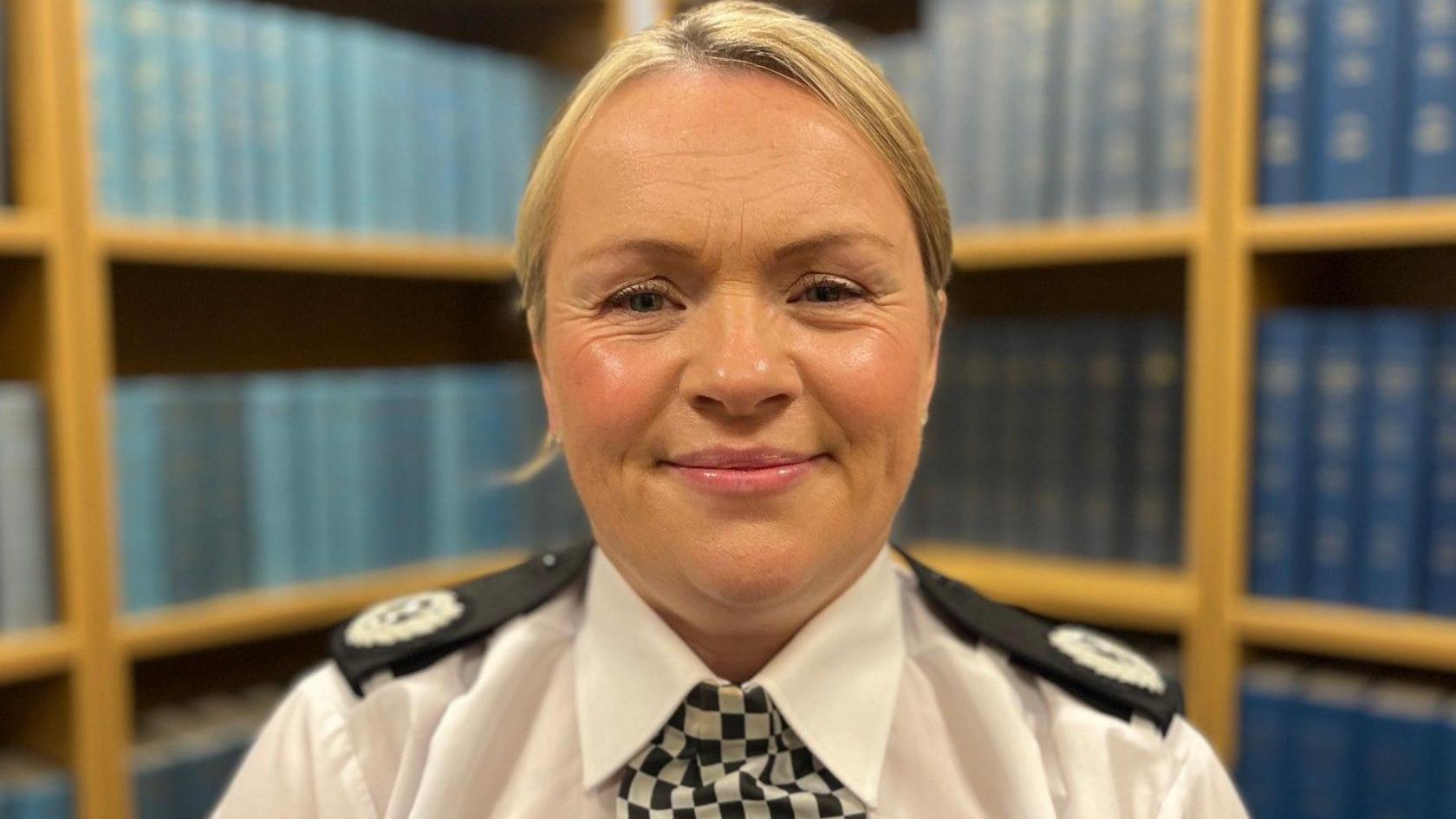Faster justice scheme rolled out across Scotland

Sheriff Principal Aisha Anwar led the pilot scheme
- Published
Thousands of victims, including domestic abuse survivors, could receive justice more swiftly under a new approach to court cases which is being rolled out across Scotland.
The initiative has already been tested in five sheriff courts and resulted in the early resolution of more than 500 cases.
It also avoided the issuing of an estimated 18,000 witness citations telling people to come to court. Of those, 11,000 were for police officers.
The project covered what are known as "summary" (non-jury) cases, which typically involve offences such as domestic abuse, assault, drink or drug driving and breach of the peace.
Summary cases are heard by a sheriff or justice of the peace without a jury and can result in prison sentences of up to 12 months and fines of up to £10,000.
More often than not they are set down for trials which are delayed and, many months later, called off just before they are due to start - usually because of a last minute guilty plea.
The new approach involves the evidence being gathered together and disclosed to the defence at the start of the process.
This leads, in some cases, to earlier guilty pleas and preventing huge numbers of witnesses being cited for trials that don't go ahead.
The summary case management pilot initially ran in sheriff courts in Dundee, Hamilton and Paisley and was expanded to Glasgow and Perth earlier this year.
Its aim was to increase the percentage of cases that are resolved as early as possible, decrease the number of witnesses who are cited to give evidence in court, and to reduce the number of trials which ultimately do not go ahead.
Figures from 2023/24 showed that 50,466 summary cases were set down for trial across Scotland, roughly a third of which involved domestic abuse.
Over the same period, only 5,746 summary trials actually heard evidence.
Reducing backlogs
The pilot tried to address the longstanding issue with court backlogs and delays in three ways:
Evidence was gathered by the police as quickly as possible and disclosed to the defence far earlier in the process
The prosecution and defence then explored the possibility of an early guilty plea
The sheriff managed the case to keep it focused
Based on the pilot scheme, the same approach nationwide would have avoided 3,300 cases being put down for trial, a potential reduction of 5%.

Summary cases typically involve offences such as domestic abuse, assault, drink or drug driving
Sheriff Principal Aisha Anwar led the pilot and attributed its success to collaboration across the sector.
She said the national rollout would be "no easy feat" but she was convinced the figures would continue to improve.
"The findings from this final evaluation are very encouraging and provide good cause for optimism," she said.
"Summary case management has the potential to transform the summary criminal justice system."
Senior figures from across the justice system have praised the new approach.
Police Scotland said 500 of its officers go to court every day, many when they are supposed to be off duty, but only about 10% are called to give evidence.
The resulting overtime bill last year was £2.6m.

Assistant Chief Constable Wendy Middleton said reducing the number of trials would free up officers
Assistant Chief Constable Wendy Middleton said reducing the number of trials would free up officers for local policing and allow them to be rested appropriately.
She said there were 170,000 citations for police to appear in court as witnesses last year.
"A citation is a legal instruction for officers to attend court," she said.
"We'd like to get to the position where that is reduced. Our officers are entitled to their time off.
"The big thing for me is releasing capacity. We need to make sure officers are spending their time in local communities."

Prosecutor Jennifer Cunningham said it was much better for victims
The pilot also involved prosecutors making early and direct contact with domestic abuse victims, by phone and in person, to help them better understand the legal process.
Jennifer Cunningham, from the Crown Office and Procurator Fiscal Service, said: "That's been one of the biggest changes for us.
"For prosecutors, it's professionally fulfilling, but more importantly it's much better for the victims.
"They've told us it makes them feel more involved and they have more trust in us to deal with their case sensitively and appropriately right from the outset.
"If we can ensure that they are properly supported through the process, it means we're more likely to have a successful outcome in the case."
But some believe defence lawyers may struggle to make the new approach work.
Simon Brown, president of the Scottish Solicitors Bar Association, said: “Whilst we can see there will be limited savings in court time in getting rid of trials at an earlier stage, what this does is give an already overworked criminal bar more and more work to do at a much earlier stage.
“It puts the onus on us to solve the government’s problems that they have caused by under funding the criminal justice sector.”

Lauren Hardie said it was important to change to process for victims
The need for change is supported by Lauren Hardie, the victim in a domestic abuse case which took 14 months to resolve and was delayed three times before the accused pled guilty.
She described a lack of information on what was happening with her case turned the legal process into “another trauma.”
“It was very isolating,” she said. “It was very scary to be in the dark about my own future.”
“I had never experienced anything like it and it was much harder than it needed to be.”
Problem-solvers
Lynn MacDonald, from Dundee-based domestic abuse advocacy service Assist, said it had been "a huge benefit" for victims.
"The system is really confusing and difficult for anybody to understand but the line of communication with prosecutors has been really helpful," she said.
Defence solicitor Matthew McGovern had been sceptical at the outset but now supports the new approach.
"At both a local and national level , defence lawyers have been treated as problem-solvers rather than as problems to be solved," he said.
"The pilot has proven that when the defence are treated with respect, the administration of justice improves."
He said the Scottish government could change the legal aid system to encourage involvement from defence lawyers nationwide.
Justice Secretary Angela Constance said the approach would make "a significant contribution" to increasing efficiency of the system, alongside new technology which allows evidence to be shared digitally.
The chief executive of the Scottish Courts and Tribunals Service Malcolm Graham said summary case management was “just one example” within a programme of reforms designed to improve the experience of people who use the justice system.